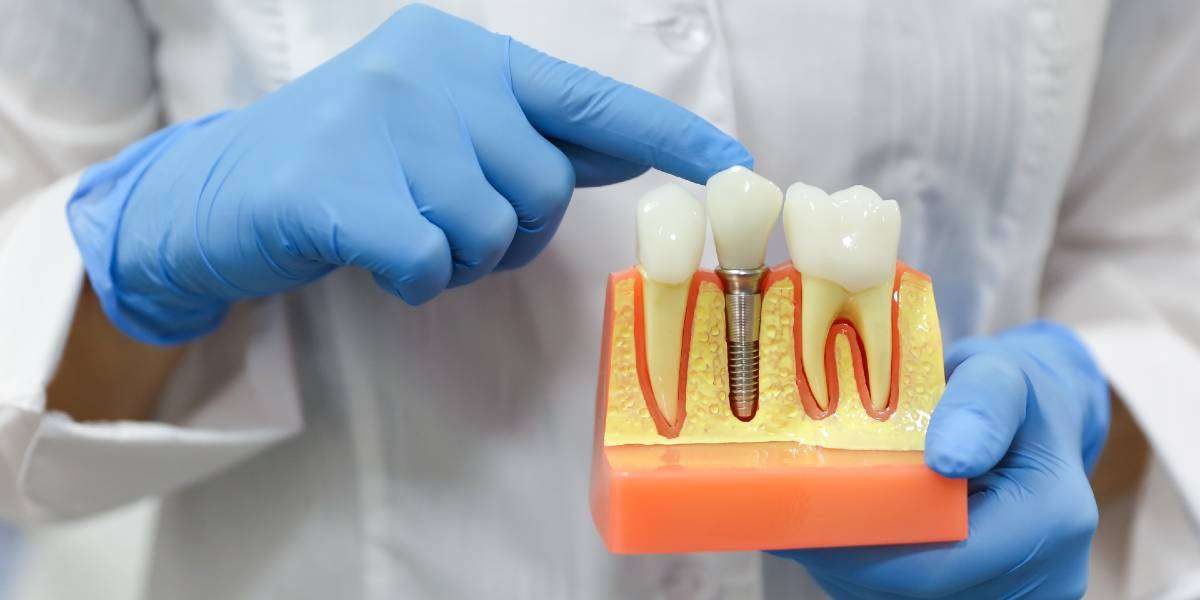The Crucial Role of Debridement in Preserving Your Implants
 Dental implants have revolutionized the field of restorative dentistry, providing individuals with a natural-looking and durable solution for missing teeth. However, like natural teeth, implants can be susceptible to certain complications, such as peri-implantitis, an inflammatory condition that affects the tissues surrounding the implant. Fortunately, debridement, a meticulous cleaning procedure, can help treat peri-implantitis and work to save your dental implants.
Dental implants have revolutionized the field of restorative dentistry, providing individuals with a natural-looking and durable solution for missing teeth. However, like natural teeth, implants can be susceptible to certain complications, such as peri-implantitis, an inflammatory condition that affects the tissues surrounding the implant. Fortunately, debridement, a meticulous cleaning procedure, can help treat peri-implantitis and work to save your dental implants.
Understanding Peri-Implantitis
Peri-implantitis is an infection that occurs around dental implants, usually caused by a buildup of plaque and bacteria. The bacteria causes inflammation and infection in the gums and bone, and while it starts with mild symptoms of tender or bleeding gums, if left untreated, can lead to gum and bone loss, removing the foundation of the dental implant. Eventually the implant will have nothing left to hold it up and it will need to be removed.
The Role of Debridement
Debridement uses special tools to thoroughly remove plaque, calculus, and infected tissues from the implant and its surrounding area. This process is usually performed by a dental professional, such as a dentist or a dental hygienist, with the goal to:
- Remove Plaque and Bacteria: Plaque accumulation is the primary cause of peri-implantitis. By meticulously removing plaque and bacteria from the implant surface and adjacent gums, debridement helps eliminate the bacteria responsible for the inflammation and tissue destruction.
- Promote Tissue Healing: By removing the infected tissue, debridement creates an environment that helps promote healing and start growing new, healthy tissue.
- Prevent Further Bone Loss: Peri-implantitis can lead to bone loss, jeopardizing the stability of the implant. Debridement stops the progression of bone loss by creating a clean surface that will protect the bone.
- Lengthen the life of the implant: Maintaining your dental health is crucial for the long-term success of dental implants. Debridement will help keep implants healthy and thriving for as long as possible.
The Debridement Process
If, after a careful exam, your dentist recommends a debridement procedure for your implant, here’s what you can expect to happen:
Scaling: The first step in debridement is scaling, which involves removing the plaque and calculus from the implant surface and surrounding gum tissues. Specialized dental instruments, such as scalers and ultrasonic devices, are used to gently scrape and dislodge the buildup without damaging the implant or gums.
Root Planing: After scaling the surfaces of your teeth above the gumline, your dentist will remove the plaque and bacteria below the gum line. This step helps discourage the reattachment of plaque and promotes better healing of the surrounding tissues.
Irrigation and Antibacterial Rinse: To further eliminate bacteria and debris, your dentist may suggest an antimicrobial rinse or irrigation solution to flush out the implant site thoroughly. This helps disinfect the area and create an environment conducive to healing.
Follow-up Care and Maintenance: Once the debridement procedure is completed, the dental professional will provide instructions for post-treatment care. This may include specific oral hygiene practices, such as proper brushing techniques, regular flossing, and the use of antibacterial mouth rinses. They will also schedule follow-up appointments to monitor the healing process and ensure the ongoing health of the implant.
It is important to note that debridement for dental implants may require multiple sessions, especially in cases of advanced peri-implantitis. Regular follow-up appointments and following your recommended oral hygiene practices are crucial to maintaining your implant’s success and longevity.
The Crucial Role of Debridement in Preserving Your Implants
If you’re concerned that you have peri-implantitis, we encourage you to schedule an appointment at North County Cosmetic and Implant Dentistry as soon as possible. The faster we can help you diagnose and treat peri-implantitis, the greater your chance of saving your implants.
Give us a call today to find out more about post-implant care.!
Recent Posts
Maintaining good oral health is essential for overall well-being. One of the key professionals who play a vital role in ensuring optimal oral health is the Registered Dental Hygienist (RDH). Let’s explore how regular visits to your RDH contribute to your overall health while giving you a healthy smile.The term “Certified Dental Hygienist” is actually…
Preventative dental care is essential for maintaining good dental health. Regular check-ups with a dentist can help identify and address potential dental issues before they become more serious. North County Cosmetic and Implant Dentistry in Vista, CA offers a range of preventative dental services to help patients achieve and maintain healthy teeth and gums.One of…
Among the most common dental problems that a general dentist treats are cavities. Most people will experience this form of tooth decay at some point due to:Dry mouthSugary foods and drinksPoor oral hygieneGeneticsThere are several types of cavities, and each can lead to complications without prompt treatment.A general dentist first considers a cavity's location when…







